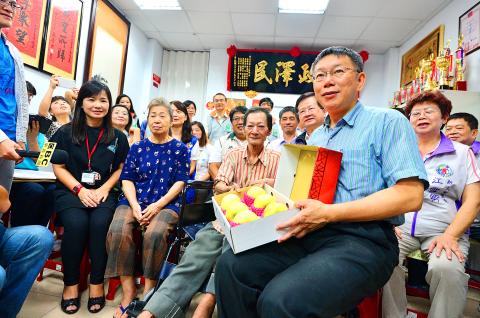Taipei Mayor Ko Wen-je (柯文哲) yesterday called on the directors of Taipei Agricultural Products Marketing Co to promptly elect a new president to prevent damage to the firm’s reputation amid soaring produce prices.
Ko made the comment in response to reporters’ queries when inspecting a long-term care program the Taipei Department of Health has implemented at the Lanzhou housing complex in Datong District (大同).
Asked to clarify a remark he made on Wednesday about the firm having “broken a promise,” Ko said that directors from different backgrounds should put aside their differences and end the infighting that has delayed the election of a new president.

Photo: Wang Yi-sung, Taipei Times
“The company was established to ensure that consumers could buy high-quality produce at reasonable prices. With vegetable prices rising nationwide, [the directors] should waste no time in electing a new president and general manager,” Ko said, adding that he was “very upset” that the company failed to elect a new president on Wednesday.
“I own the company’s premises. I signed you up to run the company on the city government’s behalf, not to engage in an internal power play,” he said.
The firm elected three new directors on Wednesday, but failed to elect a new president, with the Taipei City Government, the Council of Agriculture and the “Chang faction” each securing one seat on the board.
The Chang faction refers to board members affiliated with former Yunlin County commissioner Chang Jung-wei (張榮味) of the Chinese Nationalist Party (KMT), who has strong ties with farmers’ associations in central Taiwan that provide produce for the company.
The company’s funding comes from a mix of public and private sources, with the Taipei City Government and the Council of Agriculture together contributing 45.5 percent and the Taiwan Provincial Fruit Marketing Cooperative, farmers’ associations and vegetable growers providing the rest.
As the president, who chairs the board meetings, nominates the firm’s general manager, who directly oversees the company’s operations, Ko and the Democratic Progressive Party (DPP) had reportedly engineered a plan to remove general manager Hau Kuo-yu (韓國瑜) by helping director Lin Chiu-hui (林秋慧) get elected president.
However, as Ko and the DPP only secured two seats on the seven-member board in Wednesday’s election, Lin’s chances of being elected president are now uncertain.
Asked to respond to Lin’s comment that said if she were elected president, she would not nominate a new general manager and would let Han complete his term, Ko said that it was Lin’s personal opinion.
“My one demand is that the company settle its staffing issues as soon as possible. Do not allow internal politics to affect people’s livelihoods,” Ko said.
Ko said that he would meet with Council of Agriculture Minister Tsao Chi-hung (曹啟鴻) to discuss their strategy regarding the company.

A preclearance service to facilitate entry for people traveling to select airports in Japan would be available from Thursday next week to Feb. 25 at Taiwan Taoyuan International Airport, Taoyuan International Airport Corp (TIAC) said on Tuesday. The service was first made available to Taiwanese travelers throughout the winter vacation of 2024 and during the Lunar New Year holiday. In addition to flights to the Japanese cities of Hakodate, Asahikawa, Akita, Sendai, Niigata, Okayama, Takamatsu, Kumamoto and Kagoshima, the service would be available to travelers to Kobe and Oita. The service can be accessed by passengers of 15 flight routes operated by

Alain Robert, known as the "French Spider-Man," praised Alex Honnold as exceptionally well-prepared after the US climber completed a free solo ascent of Taipei 101 yesterday. Robert said Honnold's ascent of the 508m-tall skyscraper in just more than one-and-a-half hours without using safety ropes or equipment was a remarkable achievement. "This is my life," he said in an interview conducted in French, adding that he liked the feeling of being "on the edge of danger." The 63-year-old Frenchman climbed Taipei 101 using ropes in December 2004, taking about four hours to reach the top. On a one-to-10 scale of difficulty, Robert said Taipei 101

Taiwanese and US defense groups are collaborating to introduce deployable, semi-autonomous manufacturing systems for drones and components in a boost to the nation’s supply chain resilience. Taiwan’s G-Tech Optroelectronics Corp subsidiary GTOC and the US’ Aerkomm Inc on Friday announced an agreement with fellow US-based Firestorm Lab to adopt the latter’s xCell, a technology featuring 3D printers fitted in 6.1m container units. The systems enable aerial platforms and parts to be produced in high volumes from dispersed nodes capable of rapid redeployment, to minimize the risk of enemy strikes and to meet field requirements, they said. Firestorm chief technology officer Ian Muceus said

MORE FALL: An investigation into one of Xi’s key cronies, part of a broader ‘anti-corruption’ drive, indicates that he might have a deep distrust in the military, an expert said China’s latest military purge underscores systemic risks in its shift from collective leadership to sole rule under Chinese President Xi Jinping (習近平), and could disrupt its chain of command and military capabilities, a national security official said yesterday. If decisionmaking within the Chinese Communist Party has become “irrational” under one-man rule, the Taiwan Strait and the regional situation must be approached with extreme caution, given unforeseen risks, they added. The anonymous official made the remarks as China’s Central Military Commission Vice Chairman Zhang Youxia (張又俠) and Joint Staff Department Chief of Staff Liu Zhenli (劉振立) were reportedly being investigated for suspected “serious